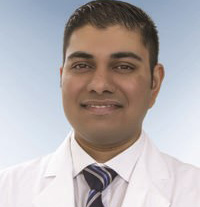Invited Speaker

Dr. Waqar Haque
Department of Radiation Oncology, Houston Methodist Hospital, U.S.A.Speech Title: Utilization of neoadjuvant intensity-modulated radiation therapy and proton beam therapy for esophageal cancer in the United States
Abstract: Background: Randomized esophageal cancer (EC) trials have utilized two- or three-dimensional conformal radiotherapy (3DCRT). Advanced radiotherapy (RT) techniques [(ARTs): intensity-modulated radiotherapy (IMRT) and proton beam therapy (PBT)] may have benefits, but are relatively unproven. This is the first study to date evaluating utilization of ARTs versus 3DCRT in the trimodality setting in the United States.
Methods: The National Cancer Data Base (NCDB) was queried (2004–2013) for newly-diagnosed cT1bT4bN0/N+M0 EC receiving neoadjuvant CRT followed by esophagectomy. The primary objective was to assess temporal trends, with multivariable logistic regression analysis assessing factors predictive of receiving ARTs. Secondarily, Kaplan-Meier analysis evaluated overall survival (OS), Cox proportional hazards modeling determined variables associated with OS, and postoperative complications were compared between cohorts.
Results: Altogether, 3,138 patients met criteria; 1,398 (45%) received 3DCRT, and 1,740 (55%) received ARTs (99% IMRT, 1% PBT). Temporally, utilization of ARTs is steadily rising in the United States, from 20% in 2004 to 69% in 2013, corresponding with a progressive decrease in utilization of 3DCRT. ARTs were more often delivered with advancing age, squamous cell histology, N2+ disease, and at academic centers (P0.05 for all). Treatment at an academic center independently correlated with improved OS (P<0.001).
Conclusions: Utilization of ARTs (IMRT in the vast majority) is steadily rising in the United States; 3DCRT is now used in a minority of patients. This has implications for payers and insurance coverage. ART use is impacted by not only age and disease factors, but also regional and facility differences. Treatment at an academic facility independently correlated with higher survival, which has implications for patient counseling.
Keywords: Esophageal cancer (EC); radiation therapy; chemotherapy; esophagectomy; intensity-modulated radiation therapy; proton beam therapy (PBT)
Biography: Dr. Haque is a radiation oncologist at Houston Methodist West Hospital and Assistant Professory of Clinical Radiation Oncology at the Houston Methodist Academic Institute and Weill Cornell Medical College. He graduated as a member of the Alpha Omega Alpha Medical Honor Society from the Baylor College of Medicine in 2010. He completed residency in radiation oncology at the University of Texas Medical Branch in Galveston, during which he also spent time training at the MD Anderson Cancer Center. In addition to practicing clinical medicine, he enrolls patients in numerous clinical trials and research studies. He also conducts his own research using large datasets of patients with cancer has published nearly 90 papers and presented his research at numerous national meetings. His research interests include the use of radiation therapy to optimize cancer treatments as well as the optimal utilization of chemotherapy to eradicate cancer.
